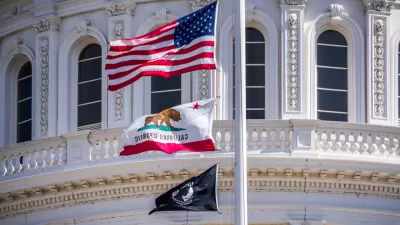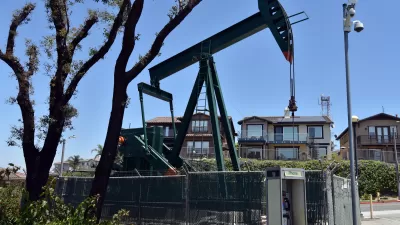In a speech on Sunday at the Ronald Reagan Presidential Library in Simi Valley, California, likely Republican presidential contender Gov. Ron DeSantis of Florida said that the pandemic was “a great test in governing philosophies."

What better state to rail against what Florida Gov. Ron DeSantis calls “lockdown politicians” than California, where Gov. Gavin Newsom had issued the nation's first stay-at-home order on March 19, 2020 to combat the nascent coronavirus that would soon devastate New York City.
“Speaking to a sold-out audience...Gov. Ron DeSantis touted how Florida has led the nation in net migration,” reports Maeve Reston for The Washington Post on March 5.
“We’ve witnessed a great American exodus from states governed by leftist politicians imposing leftist ideologies and delivering poor results. And you can see massive gains in states like Florida, who are governing according to the tried and true principles that President Reagan held dear,” DeSantis said. He said that Americans “voted with their feet” by leaving some blue states in large numbers as Florida’s population boomed.
Related posts:
- Texas, Florida Saw Most Growth in 2021, Says U-Haul, January 4, 2023
- The Great American Exodus: A Conservative's Perspective, September 27, 2022
Reston continues:
Noting that Florida’s traditionally low taxes and its penchant for small government has also served as a draw to the Sunshine State, DeSantis argued that the pandemic “caused people to reevaluate who is in charge of their state government more than any other event in my lifetime.”
Looking beyond the convincing domestic migration data, which has been posted often on Planetizen, Reston observes that the trend was "set into motion long before he became governor.”
But many experts have argued that the shift in migration patterns, particularly from states along the West Coast, has stemmed largely from the lack of affordable housing and the greater flexibility that the pandemic created for work-from-home or hybrid work arrangements. DeSantis’s remarks served as the latest example of him advancing arguments in defense of his record in Florida that sometimes mask much more complicated debates.
Two days earlier, Reston and Hannah Knowles of The Washington Post reported on another metric and pandemic policy that DeSantis touts as many metropolitan areas, particularly in California and other blue states, struggle to recover from the pandemic.
As he has sought to sharpen the contrast between Florida and blue states, DeSantis has been eager to highlight his state’s crime rate, to cast his economic policies as a magnet drawing people to Florida, and to highlight his state’s decision to keep children in school during the pandemic as a critical driver for student success. But those comparisons are often more nuanced than he would make them appear.
“Polls show DeSantis is the most formidable opponent in the Republican primary to former president Donald Trump, who is waging his third straight presidential bid. DeSantis has not announced whether he will run for president,” adds Reston in the source article on March 5.
The California governor welcomed his Florida counterpart and occasional sparring partner In the earlier piece by Reston and Knowles:
“Welcome to the real freedom state,” Newsom, a Democrat, said in a statement to The Washington Post, predicting his GOP counterpart is “going to get smoked by Trump” in the Republican primary.
FULL STORY: In Calif. speech that draws protests, DeSantis stokes fight over pandemic

Trump Administration Could Effectively End Housing Voucher Program
Federal officials are eyeing major cuts to the Section 8 program that helps millions of low-income households pay rent.

Planetizen Federal Action Tracker
A weekly monitor of how Trump’s orders and actions are impacting planners and planning in America.

Ken Jennings Launches Transit Web Series
The Jeopardy champ wants you to ride public transit.

California Invests Additional $5M in Electric School Buses
The state wants to electrify all of its school bus fleets by 2035.

Austin Launches $2M Homelessness Prevention Fund
A new grant program from the city’s Homeless Strategy Office will fund rental assistance and supportive services.

Alabama School Forestry Initiative Brings Trees to Schoolyards
Trees can improve physical and mental health for students and commnity members.
Urban Design for Planners 1: Software Tools
This six-course series explores essential urban design concepts using open source software and equips planners with the tools they need to participate fully in the urban design process.
Planning for Universal Design
Learn the tools for implementing Universal Design in planning regulations.
Ada County Highway District
Clanton & Associates, Inc.
Jessamine County Fiscal Court
Institute for Housing and Urban Development Studies (IHS)
City of Grandview
Harvard GSD Executive Education
Toledo-Lucas County Plan Commissions
Salt Lake City
NYU Wagner Graduate School of Public Service





























